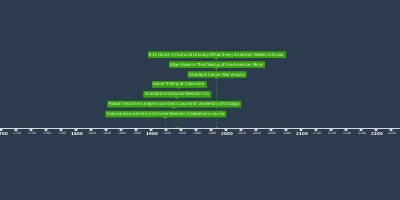sep 17, 1921 - John Erskine invents "General Honors" course
Description:
General Honors. This course, invented by John Erskine in 1921, was the forerunner of Literature Humanities in the undergraduate Core Curriculum. Discontinued in 1929, but in 1932 General Honors was resurrected as the Colloquium in Important Books for juniors and seniors.Adler co-taught this with Mark Van Doren in the 1920's. Adler may have been a student in the first course in 1921.
First year teachers included: Mortimer J. Adler, Raymond M. Weaver, Emery E. Neff, Mark Van Doren, H. W. Schneider, Rexford G. Tugwell, Arnold Whitridge, Henry Morton Robinson, Clifton Fadiman, Irwin Edman, C. W. Keyes, and J. Bartlett Brebner. (see Cross, Oasis)
From Cross, Oasis of Order:
"While faculty in the social sciences were collaborating in the creation of the Contemporary Civilization course, the humanities at Columbia were beginning their own revolution. Under the incessant prodding of Professor of English John Erskine, in 1920 the College instituted an optional two-year General Honors course, built around "great books" read in translation and discussed in small groups. Although no one seems to have realized it at the time, this proved to be the first decisive step toward the creation of the second main pillar of Columbia's core program - the Humanities sequence."
Right away they run in to the problem of defining "great", and just decide to let Erskine draw up the list. Erskine's take: "A great book," he said, "is one that has had meaning, and continues to have meaning, for a variety of people over a long period of time." (Cross, Oasis, ch. 2). This is a flexible and allusive approach, valuing ambiguity, richness, and continued debate about meaning rather than "fixed contributions to knowledge" from the text. Works that repay return, lifelong learning. Because it had special extra academic requirements for students to join the course, it was perceived as elitist.
FASCINATING: Cross, Oasis of Order, ch. 2: "most later great books courses have kept about eighty-five percent of Erskine's original readings" !!!!!
Pace: one book a week, 2 instructors to spur discussion, seminar class of 25-30. Each section had two instructors: aim for discussion was an immediate appreciation of the work. "delight for cultivated layman" (Cross)
http://c250.columbia.edu/c250_celebrates/remarkable_columbians/john_erskine.html: "Erskine's conception of a General Honors course in classic texts spawned the Colloquium on Important Books and later Humanities A. Though he never taught in a freshman core course, Erskine's influence on general education courses extended beyond the College to affect all of American education....Erskine's expectations of a true education are embodied in the title of his most important essay, "The Moral Obligation to Be Intelligent," [see http://keever.us/erskine.html] and he infused his students with this zeal. His successful promotion of the General Honors course in 1920 was a pivotal event in twentieth-century American education."
Erskine may have been the first to combine a "greats' list (his had 52 works) with group discussion on each book for two hours
Angelicum claims that the course was popular and in 1923 the number of discussion groups increased and there were two instructors in the room to ensure a broader knowledge base due to the diversity of texts
https://vimeo.com/353418047?embedded=true&source=vimeo_logo&owner=8769849
Added to timeline:
Date:
sep 17, 1921
Now
~ 104 years ago
